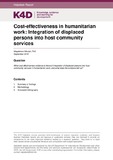| dc.description.abstract | With unprecedented numbers of displaced persons around the world, the humanitarian system is facing huge financial pressures. The existing literature makes a strong case for the integration of displaced persons into host community services and labour markets, making displacement a development issue as well as a humanitarian issue (WBG, 2017; UNCHR, 2018). There is evidence that joint humanitarian and development programmes can improve displaced persons and host communities’ access to services and livelihoods (Centre on International Cooperation, 2015). The reviewed literature acknowledges that integration puts strain on local communities, as many encounter problems meeting the demand for services that comes with the increase in population. Affordable housing, education, and availability of income-generating opportunities can be considered the primary drivers of tension (ORSAM, 2015; REACH, 2014). Consequently, it is agreed that for integration programmes to be effective and foster social cohesion, they must also benefit host communities. The literature reviewed further demonstrates that integrating support for refugees into mainstream government service provision, where it exists, can be more cost effective and sustainable than setting up large-scale camps and setting up parallel humanitarian service delivery channels (WBG, 2015). Integration of displaced persons into host community services is seen as a more sustainable and cost-efficient approach than camps (UNHCR, 2014). For the forcibly displaced in camps, services provided by agencies may be better to what is available locally and moving to country systems may result in a net loss of welfare (WBG, 2017). Systemic obstacles exist whereby weak incentives for governments and communities to integrate displaced people into the economy and services, combined with weak incentives for development and humanitarian actors to join up their efforts, results in inadequate, costly and unsustainable programs (Centre on International Cooperation, 2015). Access to formal employment opportunities has been seen as particularly crucial for improving outcomes for displaced persons, as an opportunity to be employed, including self-employed and possibly even creating livelihoods for others, is a sign of economic integration (Mixed Migration Centre, 2017). Finally, the literature reviewed presents a good range of examples of effective integration of displaced persons into education and health systems (UNCHR, 2017; Centre on International Cooperation, 2015; UNICEF, 2018; UNCHR, 2018). | en |

